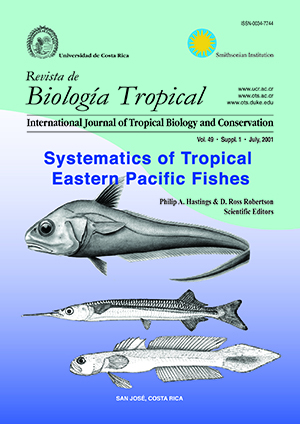Abstract
A new eastern Pacific achirid, Trinectes xanthurus, has a distinctive yellow or light caudal fin, without pattern, to contrast with its relatively dark body. This species also has black, posterior margins of the dorsal and anal fins and 21- 22 caudal vertebrae, versus 19-20 for its Pacific coast congeners. It usually is found in shallow, continental shelf waters on sand or mud bottoms and ranges from Colombia to El Salvador. The genus Trinectes is represented in the eastern Pacific by four species. A fifth species usually occurs in Pacific slope drainages (freshwater) in Panama. Of these species, only Trinectesfonsecensis is found throughout the tropical eastern Pacific, while the other three coastal species are confined to tropical waters south of the Golfo de Tehauntepec.References
Dawson, C.E. 1978. Soleidae. In W. Fischer (ed.). FAO species identification sheets for fishery purposes. Western Central Atlantic (Fishing area 31). vol. V. FAO, Rome.
Hubbs, C.L. & K.F. Lagler. 1958. Fishes of the Great Lakes region. Cranbrook Inst. Sci. Bull. No. 26, Bloomfield Hills, Michigan.
Krupp, F. 1995. Achiridae. p. 845-850. In W. Fischer, F. Krupp, W. Schneider, C. Sommer, K. E. Carpenter & V. H. Niem (eds.). Guía FAO para la identificación de especies para los fines de la pesca. Pacífico Centro- Oriental. FAO, Roma.
Leviton, A.E., R.H. Gibbs, Jr., E. Heal & C.E. Dawson. 1985. Standards in herpetology and ichthyology. Part I. Standard symbolic codes for institutional resources collections in herpetology and ichthyology. Copeia 1985: 802-832.
Comments

This work is licensed under a Creative Commons Attribution 4.0 International License.
Copyright (c) 2001 Revista de Biología Tropical


